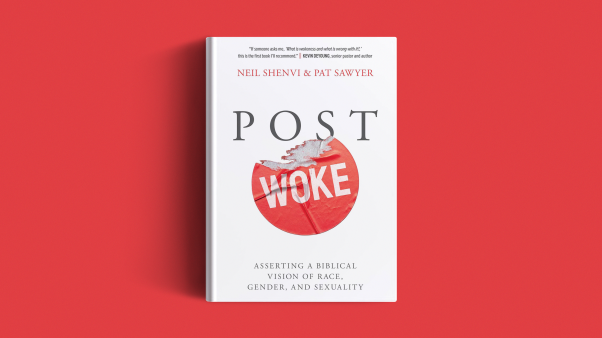As the oldest of three children in a single-parent family, I remember we struggled to cover the rent most months and still have enough for groceries. We moved so often that, by the time I reached middle school, I no longer bothered to put away the moving boxes in my closet. As a teenager I craved stability. So it surprised even me when, a few years after college, I willingly left a stable career with a cardboard box in my hands and tears in my eyes.
At age 25, I was enjoying the kind of security I had longed for. I had married my high-school sweetheart and was the youngest account manager at a marketing firm where I helped clients to tell their stories. Yet I sensed a pull down a different path. Instead of telling my clients’ stories, I thought, maybe God wants me to tell his story—the story of his in-breaking kingdom.
After much prayer and many conversations, my wife and I liquidated our retirement accounts, left our jobs, and moved 6,000 miles to England so I could study theology at Oxford University. I saw this education as a way to enrich my writing, to help others see the world through the lens of Christ’s life, death, and resurrection. Yet even as I was confident that God had called me in this direction, part of me wondered what it even meant to be called.
Having spent the past few years writing about calling, I have realized I’m not alone.
Let Your Life Speak
My quest to understand calling began when I was an anxious college freshman. Reading Parker J. Palmer’s classic Let Your Life Speak, I was struck by his description of vocation: “something I can’t not do, for reasons I’m unable to explain to anyone else and don’t fully understand myself but that are nonetheless compelling.” For Palmer, vocation is deeply connected to identity: God’s purpose for one’s life is found in God’s design of one’s life. “Our deepest calling,” he explains, “is to grow into our own authentic selfhood . . . the seed of true self that was planted when I was born.”
It soon became clear to me that writing is that which I cannot not do. Shortly after Jen and I married, I began slipping out of bed well after midnight so I could record thoughts on my laptop. I would leave work at the marketing firm late so I could scratch down reflections I had throughout the day. Even before I began to question God’s call on my life, I wondered about this urge to write.
Palmer encourages Christians to examine our lives’ particularities to find out what we were created for. This may very well be different from who you want to be or what you want to do. And this introspective work is not to be done in isolation. It is performed best within a community of faithful Christians who know you and are actively seeking God’s will. In community is where God’s call is most clearly discerned.
The Holy Spirit often speaks to us through others. Proverbs underscores the importance of surrounding ourselves with many counselors (Prov. 15:22). The story of Samuel in the temple suggests we need older, godly men and women to help us hear God’s word to us (1 Sam. 3:1–9). Notice that after Christ’s ascension into heaven, the disciples waited together to receive direction from the Holy Spirit (Acts 2).
Jen and I were leading a young marrieds group at our church with another, older couple as we considered moving to England. At that point, it was clear to us that writing was that which I could not not do. But I still wasn’t sure that was what God was calling me to do. The couple, Doug and Carol, knew us and our dilemma, so we invited them into the discernment process. “If you don’t go after this now,” Doug told me, “you’re going to spend the rest of your life wondering, What if?” That outward sign confirmed an inward prompting.
Calling always assumes a caller. And for Christians, that Caller is the living God.
Twelve years after I read Palmer, a professor introduced me to Frederick Buechner. In poignant reflections on his vocational journey, the Presbyterian pastor and memoirist offers insights on vocation as elegant as they are wise. Jen and I had recently returned from England to continue my studies, and I was hoping to publish my first book. After receiving several rejection letters, I grew anxious, wondering whether the writing life was really what God had for me or merely arose from my own ambition. During that vocation crisis, Buechner offered a timely voice.
Buechner defines vocation—from the Latin word vocare, meaning “to call”—as “the work a person is called to by God.” In other words, calling always assumes a caller. And for Christians, that Caller is the living God.
While Palmer highlights the inward search—“let your life speak”—Buechner connects vocation to outward needs, encouraging us to attend to the people and communities around us. “The place God calls you to,” writes Buechner, “is the place where your deep gladness and the world’s deep hunger meet.”
For me, that outward look came in the form of the final text message my sister-in-law sent me before her unexpected death at age 19. Hayley had struggled with drugs and alcohol, and she hadn’t attended church regularly for some time. Yet she was reading my writing and sharing it with her roommates. “You’re going to impact a lot of people’s lives,” Hayley told me in that final text. “You have mine.”
Together, Palmer and Buechner encouraged me to pay attention to moments in my life when I felt most alive, and to discern what those moments say about what I have to offer. Buechner, in particular, taught me not to overlook the ways in which the “deep hungers” of this age can bring out my God-given gifts.
As our culture rarely helps us to reflect on anything beyond the most immediate demands for our attention, most of us would do well to reflect on what the particular qualities of our lives say about what we were made to do. But calling cannot be discovered by only looking at ourselves. We need a voice from the outside to guide us.
The Hidden Christ Who Calls
“Nein!” is how theologian Karl Barth responded to Emil Brunner’s notion that the created world, as God’s handiwork, reveals God’s will. In a prominent exchange, Brunner acknowledged that sin has blemished creation’s original image. But he maintained that God’s will remains apparent in the world as a “remnant,” accessible to human minds apart from Scripture or revelation in Jesus Christ.
Barth believed Brunner had conflated human reason with divine revelation. He insisted that any approach to discerning God that does not begin and end with Scripture or Christ must be rejected.
Barth’s counterpoint has important implications for how we define calling. For example, when we look only to the needs of the world and our own dreams and desires, we risk placing a divine stamp of approval on our own will. We can easily mistake our dreams, talents, and ambitions as God’s will for our lives when they may be no more than our own will.
Dietrich Bonhoeffer, Barth’s contemporary and interlocutor, encouraged Christians seeking God’s will to turn to the living Christ, rather than risk baptizing their own ambitions. “It is the hidden Christ who calls,” wrote Bonhoeffer. “The call as such is ambiguous. What counts is not the call but the one who calls.”
For Bonhoeffer, the way to hear Jesus’ call is to listen to the Word preached and to receive Communion. We must listen for the voice of the One who calls in the context of the church. Godly community helps defend against confusing our ambitions with God’s will. In discerning the latter, we must be careful not to simply baptize the former. We must always be willing to give back to God even what we believe to be his call on our life.
Does this mean that we should disregard our deepest passions and our world’s greatest hungers when seeking to glorify God in our decisions? The answer is both yes and no.
Palmer and Buechner rightly encourage us to take inventory of our talents and passions so that we can steward them well. But we’d be mistaken to think that all we need is careful self-examination, the right personality assessment, or a Venn diagram to determine how God will use such gifts. When it comes to knowing how our talents and passions will manifest in God’s call on our life, there is no one-to-one relationship between such gifts and God’s will.
A Story-Shaped Calling
So how do we discern God’s will without conflating it with our own dreams and ambitions? One way is to think about calling in terms of story. This means asking: “If the risen Christ calls me to follow him, and if calling is conceived primarily in terms of that call, what shape should my life take?”
This story-form approach is a more dynamic understanding of what it means to be called. For one, it does not mean we ignore our passions, talents, or life experiences. Those are all part of the story, but they no longer present a static blueprint or life plan. They are elements of the story and, therefore, should never direct the story. Which means our response to Christ’s call is always determined in the daily moments of our lives, usually by asking, “How do my gifts, and the needs around me, inform how I will respond to Christ’s call?” Calling, therefore, is less like a plan and more like a posture. In other words, it is discipleship. And discipleship is always embodied in community, among other believers.
Calling is less like a plan and more like a posture. It is discipleship. And discipleship is always embodied in community, among other believers.
This way of thinking about calling has been helpful in some of my deepest valleys.
I’ll never forget sitting with Jen and our infant daughter in a dim, musty North Carolina social services office. I had just received a wave of publishers’ rejection letters. A social worker explained in a monotone voice that our family qualified for food stamps.
Yet in that moment of need and insecurity, I experienced a peace that can only be described as surpassing all understanding. I was given confidence that we were exactly where God wanted us. Instead of wiping away tears, I kissed my wife on her forehead and smiled at our apple-cheeked daughter.
Somewhere in my pursuit of what I believed to be God’s call, I had lost sight of the One who calls. By viewing my passion for writing as a static revelation of “my calling,” I neglected the needs right in front of me—such as my wife’s. It wasn’t until we returned to the States, and were seated in the reality from which I had spent most of my life running, that I realized what it means to be called.
Calling wasn’t so much about writing or theology per se. Rather, it was about daily offering up all that I am—my passions, experiences, talents—as I faithfully embody these gifts in a community that witnesses to Christ’s “follow me.” It was only when I loosened my grip on what I believed to be God’s static, specific call on my life that I was free to once again follow the One who called in the first place.
Ryan J. Pemberton is author of Called: My Journey to C. S. Lewis’s House and Back Again (Leafwood Publishers).










